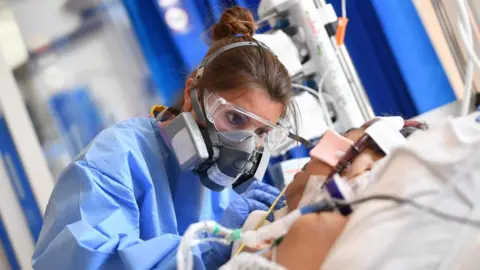Coronavirus: Outbreak exercise showed ‘clear gap’ in readiness
 Getty Images
Getty ImagesAn exercise simulating a coronavirus outbreak in Scotland, which was shared with a UK government advisory group, showed a "clear gap" in preparedness, the BBC has learned.
A report into "Exercise Iris" revealed frontline staff "unease" over personal protective equipment and "the need for substantive progress".
The exercise simulated an outbreak of Middle East Respiratory Syndrome.
The Scottish government says its findings were shared with attendees.
Middle East respiratory syndrome (MERS-CoV) is a coronavirus like SARS-Cov-2 but has different characteristics.
Like the novel coronavirus, MERS-CoV causes a respiratory disease and key symptoms include fever and a cough. However, transmission rates are believed to be far lower and fatality rates are much higher.
BBC News has learned an exercise was undertaken simulating an outbreak of the disease in 2018 and requested the findings under the Freedom of Information Act in April. The Scottish Government has now published a report of its findings.
The outcomes were shared with the expert committee that advises the UK government on pandemics, the New and Emerging Respiratory Virus Threats Advisory Group (Nervtag) in June 2019.
"Exercise Iris" was a tabletop exercise which took place at a hotel in Stirling on 12 March 2018 and involved health boards, Health Protection Scotland, the Scottish Ambulance Service and NHS 24, the telephone advice service.
Exercise discussions revealed concerns around the availability of personal protective equipment (PPE) and underlined "the need for substantive progress on PPE use within Scotland", according to the report.
"Issues around PPE are not unique to a MERS-CoV outbreak", it said.
The report conclusions also note an "unease" amongst frontline staff over the lack of clarity on PPE availability, training and testing.
"This is a clear gap in Scotland's preparedness for MERS-CoV and other outbreaks and needs to be addressed as soon as possible."
'Lost opportunity'
The report also warns of the demands of contact tracing.
One scenario in the exercise features "escalating resource requirements for contact tracing and follow up". As a result, health boards were asked to consider the impact of extensive contact tracing.
"It feels like a lost opportunity", says Professor Devi Sridhar, chair of public health at Edinburgh University and a member of the Scottish Government COVID-19 Advisory Group.
"On the positive side it's good that these exercises were conducted, because it meant that they were thinking beyond flu, they were thinking about coronaviruses.
"But on the negative side it's surprising, it seems that SAGE (Scientific Advisory Group for Emergencies) members were unaware or at least didn't discuss this exercise in their thinking in January or February, which would have been crucial in making steps to actually prepare for an eventual outbreak".
"It's the whole purpose of these exercises, to learn from them", she added.
A report detailing the findings of an exercise simulating pandemic influenza called "Exercise Cygnus", which was run in England in October 2016, was also not published.

- PUBLIC TRANSPORT: Is it safe to travel?
- FACE MASKS: Should I be wearing one?
- RISK AT WORK: How exposed is your job?
- LOOK-UP TOOL: How many cases in your area?
- GLOBAL SPREAD: Tracking the pandemic

The report into the MERS coronavirus exercise says Public Health England held a previous exercise in 2016 "which identified a series of actions for improvement".
At two meetings, in June and December 2018, Nervtag asked for the report into the exercise to be circulated within the group.
Minutes of a meeting from June 2019, when the report was shared, say "most of the recommendations have now been implemented or are in the process of being implemented" by Health Protection Scotland's resilience group.
The Scottish government said the report was shared with all attendees.
"The output from this exercise has been considered in line with wider work on health protection preparedness carried out through the Scottish Health Protection Network", it said.
The Department for Health and Social Care said: "As the public would expect, we regularly test our preparedness for emergencies - allowing us to rapidly respond to this unprecedented crisis."
